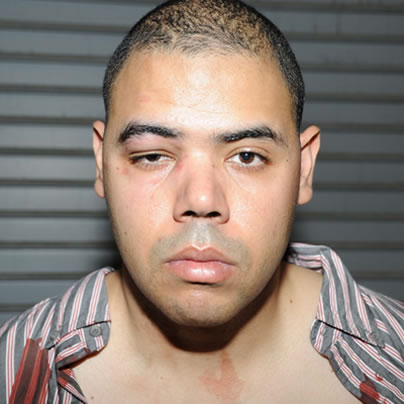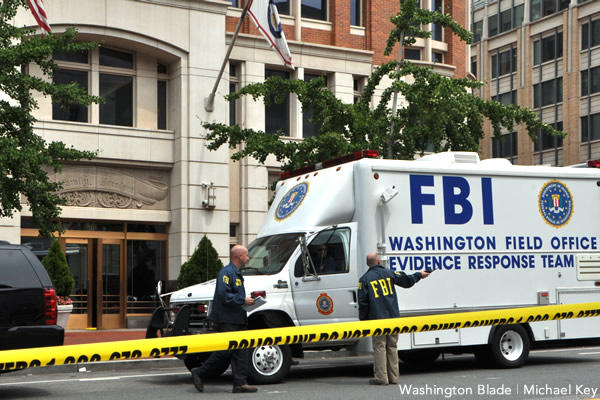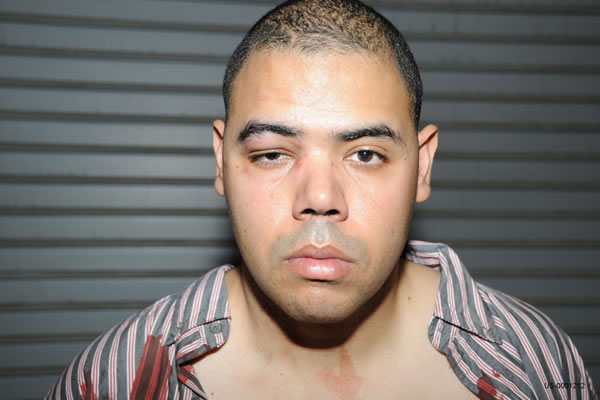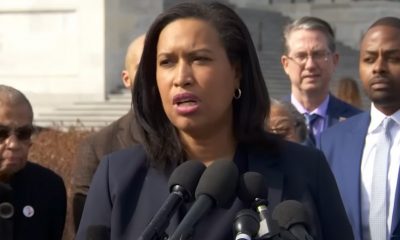Local
Gov’t seeks 45-year prison term for FRC shooter
LGBT Center surfaces in FBI interrogation of Corkins


Floyd Lee Corkins — who pled guilty to three felony charges in February — volunteered at D.C.’s LGBT community center. (Washington Blade file photo by Michael Key)
UPDATE:
At a court status hearing on Monday, U.S. District Court Judge Roberts rescheduled Corkins’ sentencing hearing for July 15. He also reaffirmed his denial of bail for Corkins, who has been in jail since the time of his arrest last August.
Hours before his arrest last August for shooting a security guard in the arm in the lobby of the anti-gay Family Research Council (FRC) headquarters in downtown Washington, Herndon, Va., resident Floyd Lee Corkins II, 28, says he told his parents he needed to use their car to drive to the D.C. LGBT Community Center, where he said he worked as a volunteer.
According to a 22-page transcript of an FBI interview of Corkins on the day of his arrest on Aug. 15, 2012 — which prosecutors released in a court filing last week — Corkins told FBI agents that instead of going to the LGBT Center he drove the family car to the East Falls Church Metro station.
From there he said he took the Metro to the Gallery Place station and walked to the FRC building at 801 G St., N.W., with the intention of killing as many people as possible.
“I wanted to kill the people in the building and smear a Chicken-fil-A sandwich on their face,” the FBI transcript quotes Corkins as saying.
Police and prosecutors said the heroic action by the unarmed security guard, who wrestled Corkins to the floor and took away the gun after being shot in the arm, prevented Corkins from reaching the upper floors of the FRC building where at least 50 employees were working at their desks.
Corkins pleaded guilty in February to three felony charges, including committing an act of terrorism while armed, assault with intent to kill while armed, and interstate transportation of a firearm and ammunition. He faces a possible maximum sentence of 70 years in prison.
He had been scheduled to be sentenced Monday, April 29. But U.S. District Court Judge Richard W. Roberts agreed on April 22 to a request by Corkins’ attorney to postpone the sentencing to give the attorney, David W. Bos, more time to review the status of Corkins’ mental health.
Citing information not previously disclosed, Bos stated in a motion seeking the postponement that Corkins had been the subject of a “72-hour civil commitment in February 2012, which led to the mental health treatment the defendant was receiving at the time he committed the instant offense.”
In his interview with the FBI agents, Corkins hedged about whether he was committed or entered a treatment facility voluntarily, but said the treatment took place during a time when he was living in San Francisco.
“… I went to seek help and I got charged with a 51-50,” he said.
“What’s a 51-50?” one of the FBI agents asked him.
“It’s if they think you are a danger to yourself or to others,” Corkins replied.
Corkins said he left San Francisco and moved back to his parents’ home in Herndon around April of 2012.
The fact that he purchased a handgun and large quantities of ammunition from a Virginia gun store in August just six months after being committed for a mental health condition linked to possible danger to others comes at a time when President Obama and gun control opponents continue to argue over legislation aimed at requiring stricter background checks for gun purchasers.
In what appears to be a calm, matter-of-fact discussion, Corkins told two FBI agents who conducted the interview that he disagreed with the FRC’s anti-gay positions, including its statement of support for the Chick-fil-A restaurant president, who said he opposes same-sex marriage.
Corkins said in the interview that he bought 15 Chick-fil-A sandwiches one day earlier, the same day he practiced shooting his recently purchased revolver at a gun range in Chantilly, Va. He said he carried the gun, three magazines with 15 rounds of ammunition each, and the sandwiches in the backpack he brought to the FRC building.
“I consider myself a political activist,” he told the FBI agents. “[S]o I was going to use that as kind of a statement,” he said of his plans to smear the sandwiches in the faces of the people he planned to shoot.
Corkins mentioned his affiliation with the LGBT Center at the beginning of his FBI interrogation.
“Were you home when you got up in the morning today?” one of the agents asked Corkins.
“Yeah, I was at home,” he replied.
“Just walk us through when you got up,” the transcript quotes the agent as saying.
“Uh, let’s see. I got up in the morning,” Corkins replied. “I told my parents, I volunteer at the D.C. Center, the LGBT center. So I told my parents I was going down there today and that I needed the car,” he told the FBI agents.
“The night before I had loaded three magazines full of bullets, I planned on going down to the [FRC] building … ,” Corkins told the agents.
At the time of the FRC shooting, officials with the D.C. LGBT Center said Corkins volunteered there as a front desk clerk in 2011. Center officials joined local and national LGBT leaders in condemning Corkins’ actions, saying they support his prosecution to the fullest extent of the law.
Center officials said at the time that Corkins showed no signs that he could be capable of committing an act of violence but gave no further details of Corkins’ relationship with the Center other than that he was a part-time volunteer.
D.C. Center Executive Director David Mariner told the Blade early Monday that the Center would have no further comment on the matter other than the statement Mariner issued last August at the time of the FRC shooting incident.
“I was shocked to hear that someone who has volunteered with the D.C. Center could be the cause of such a tragic act of violence,” Mariner said in that statement. “No matter the circumstances, we condemn such violence in the strongest terms possible. We hope for a full and speedy recovery for the victim and our thoughts are with him and his family.”
The Office of the U.S. Attorney for the District of Columbia, which is prosecuting the case, submitted the FBI interview transcript as one of several exhibits attached to a 32-page sentencing memorandum filed in court on April 19.
The U.S. Attorney’s office also submitted as an exhibit a full video of the FBI interview with Corkins. The video became part of the public court record and is available for viewing and copying on the federal court system’s website.
The Family Research Council promptly posted an excerpt of the video on its own website that shows Corkins telling the FBI agents he selected the FRC as a target after seeing it listed as a “hate group” on the website of the Southern Poverty Law Center, a national civil rights organization.
In an April 25 press release, FRC President Tony Perkins called the SPLC’s decision to list FRC as a hate group a “reckless labeling [that] has led to devastating consequences.”
Added Perkins, “Because of its ‘hate group’ labeling, a deadly terrorist had a guide map to FRC and other organizations. Our team is still dealing with the fallout of the attack that was intended to have a chilling effect on organizations that are simply fighting for their values.”
SPLC has said it lists FRC as a hate group based, among other things, on what it says are FRC’s false and defamatory claims linking homosexuality and LGBT people to pedophilia. SPLC officials have criticized Perkins for misrepresenting their position, saying they never label an organization as a hate group based on its political views or public policy positions.
The sentencing memorandum outlines the government’s reasons for asking Judge Roberts to sentence Corkins to 45 years in prison.
“The defendant, the lone gunman and perpetrator of this attempted massacre, had the malicious intent and engaged in the requisite planning and effort necessary to achieve his purpose,” the memo says. “Fortunately, he was thwarted by the heroic intervening actions of Leonardo Johnson, a building manager/security guard who was seriously injured as a result.”
Johnson, who was unarmed, is credited with tackling Corkins seconds after Corkins pulled out a 9mm handgun from a backpack he was carrying and pointing it at Johnson. Johnson sustained a gunshot wound to the arm as he wrestled Corkins to the floor of the lobby of the FRC building and took possession of the gun.
D.C. police arrived on the scene minutes later and arrested Corkins. The FBI also became involved in the case.
D.C. police and the FBI said Corkins told authorities that had he gotten past Johnson, he would have taken the elevator to the building’s upper floors and opened fire on the 50 or more FRC employees working that day.
“The defendant’s crimes are serious and warrant severe sentences – not only to punish the defendant for his actions, but to keep the community safe from him and deter other would-be mass murderers and domestic terrorists from following suit,” the sentencing memo says.
“Accordingly, the government respectfully requests that the Court sentence the defendant to a combined term of imprisonment of 45 years,” the memo says.
A new sentencing date was expected to be announced at the status hearing scheduled for 11 a.m. Monday.
In his motion seeking the postponement of the sentencing hearing, defense attorney Bos said the state of Corkins’ mental health should be taken into consideration in the sentencing process.
“While counsel believes the defendant’s mental health history does not bear on the defendant’s competency to proceed in this matter, counsel believes the defendant’s mental health history is relevant to the appropriate sentence in this case.”

Floyd Lee Corkins II (Photo courtesy the U.S. Attorney’s Office)
District of Columbia
Two charged with assaulting, robbing gay man at D.C. CVS store
Incident occurred after suspects, victim ‘exchanged words’ at bar

D.C. police just after 1 a.m. on April 10 arrested two men for allegedly assaulting and robbing a gay man inside a CVS store at 1418 P St., N.W., according to a police report and charging documents filed in D.C. Superior Court.
The charging documents state that the alleged assault and robbery occurred a short time after the three men “exchanged words” at the gay bar Number 9, which is located across the street from the CVS.
The arrested men are identified in the charging documents as Marquel Jose Diaz, 27, of Northwest D.C., and Lorenzo Jesse Scafidi, 21, of Elizabeth City, N.C. An affidavit in support of the arrest for Diaz says Diaz and the victim “were previously in a relationship for a year.”
Court records show Diaz was charged with Simple Assault, Theft Second Degree, and Possession of a Controlled Substance. The court records show the controlled substance charge was filed by police after Diaz was found to be in possession of a powdered substance that tested positive for cocaine.
Scafidi was charged with Simple Assault and Theft Second Degree, the court records show.
The D.C. police report for the incident does not list it as a suspected hate crime.
The court records show both men pleaded not guilty to the charges against them at a Superior Court arraignment on the day of their arrest on April 10. The records show they were released by a judge while awaiting trial with an order that they “stay away” from the victim. They are scheduled to return to court for a status hearing on May 21.
The separate police-filed affidavits in support of the arrests of both Diaz and Scafidi each state that the two men and the victim “exchanged words” inside the Number 9 bar. The two documents state that both men then entered the CVS store after the victim went to the store a short time earlier.
Scafidi “came into the CVS shortly after and entered the candy aisle and slammed Complainant 1 [the victim] to the ground causing Complainant 1’s phone to fall out of CP-1’s pocket,” one of the two affidavits says. It says Scafidi “again picked up CP-1 and slammed him to the ground.”
The affidavit in support of Diaz’s arrest says Diaz also followed the victim to the CVS store after words were exchanged at the bar. It says that after Scafidi allegedly knocked the victim down in the candy aisle Diaz picked up the victim’s phone, “swung on” the victim “while he was still on the ground,” and picked up the victim’s watch before he and Scafidi fled the scene.
Without saying why, the two arrest affidavits say Diaz and Scafidi returned to the scene and were arrested by police after the victim and at least one witness identified them as having assaulted and robbed the victim.
Attorneys representing the two arrested men did not respond to phone messages from the Washington Blade seeking comment and asking whether their clients dispute the allegations against them.
The victim also did not respond to attempts by the Blade to obtain a comment from him. The police report says the victim is a resident of Fairfax, Va.
District of Columbia
Bowser calls for ‘extraordinary’ response to reduction in D.C. budget
Impact on city funding for LGBTQ programs and grants unclear

D.C. Mayor Muriel Bowser on April 15 issued an executive order calling for “extraordinary actions,” including “significant cuts in District Government services,” to address a decision by Congress to cut the city’s current budget by $1.1 billion.
The nine-page executive order points out that these actions became necessary after the U.S. House of Representatives has so far declined to vote on a free-standing bill approved by the U.S. Senate last month that would restore the $1.1 billion D.C. budget cut initially approved by the House.
In addition to large-scale cuts in city services, the mayoral order says the congressionally imposed city budget cut will bring about city “hiring freezes, financial impacts to employees, reductions and terminations in contracts and grants, and closures of District Government facilities.”
The order adds, “These are unprecedented actions given that the District itself adopted and is able to implement a fully balanced budget, but they are necessary due to the Congressional cut to the District’s budget and its inaction in timely fixing its legislative error.”
The House adjourned this week on a recess until the end of April, and congressional observers say it is unclear whether the majority Republican House will take up the Senate bill to undo the D.C. budget cut when the House returns from its recess. President Donald Trump has called on the House to approve the bill to restore the full D.C. budget.
Among the D.C. LGBTQ organizations and those providing services to the LGBTQ community that receive D.C. government funding and that could be impacted by the budget cuts are Capital Pride Alliance, which is organizing WorldPride 2025 set to take place in D.C. next month; and Whitman-Walker Health, one of the city’s largest private healthcare organizations that provides medical services for LGBTQ clients.
Also receiving city funding are the Wanda Alston Foundation, which provides housing services for LGBTQ people; and the LGBTQ youth advocacy and services organization SMYAL.
Spokespersons for the four organizations couldn’t immediately be reached to determine if they knew whether the soon-to-be implemented budget cuts would have an impact on the city funding they currently receive.
In response to questions from news reporters during an April 15 press conference call to discuss the Bowser executive order, Jenny Reed, director of the D.C. Office of Budget and Performance Management, said details on specific programs or funding allocations set to be cut would not be known until the mayor submits to the D.C. Council her Supplemental FY 2025 budget along with her proposed FY 2026 budget.
Reed was joined at the press briefing by Lindsey Parker, Mayor Bowser’s chief of staff; and Tomas Talamante, director of the Office of Intergovernmental Affairs.
They and other city officials have said the impact of the congressionally imposed city budget cut was expected to be lessened but remain highly problematic by Bowser’s decision to invoke a 2009 law that allows the city to increase its own spending without approval by Congress under certain circumstances.
The mayor has said under that law, the city would need to cut its FY 2025 budget by $410 million rather than by $1.1 billion. It couldn’t immediately be determined whether House Republicans, who initiated the requirement that the D.C. budget be cut by $1.1 billion, would challenge the mayor’s plan to invoke the 2009 law to reduce the size of the budget cut.
“Without the ability to fully execute the Fiscal Year 2025 budget as adopted and approved by the District, this gap will force reductions in critical services provided by our largest agencies, including the Metropolitan Police Department and the Fire and Emergency Medical Services Department,” the mayor’s executive order states.
“The District will continue to work with members of the House of Representatives to urge them to vote to fully restore the District’s Fiscal year 2025 budget and will continue to work with President Trump to strongly encourage the House of Representatives to take that action,” the order says.
District of Columbia
LGBTQ budget advocates fight for D.C. resources in a tough fiscal year
‘Trying to preserve life-saving services’ amid $1 billion cut

The months and days leading up to June are especially busy for LGBTQ Washingtonians. For one group, the DC LGBT Budget Coalition, which works year-round to ensure LGBTQ residents are represented and financially supported by the D.C. government, this time of year is their Super Bowl. Beginning in April, the D.C. Council and Mayor’s Office hold budget hearings for the next fiscal year.
With D.C.’s budget now under review, the Washington Blade spoke with Heidi Ellis, coordinator of the DC LGBT Budget Coalition, about the group’s top priorities and their push to ensure continued support for queer communities.
“The LGBTQ Budget Coalition was founded in 2020 at the height of the pandemic, as a way for the community to work together to advocate for key funding and policy changes,” Ellis said. “We recognized we were stronger together. A lot of groups are often pitted against each other for resources and dollars. This coalition was founded out of a need for unity. Since then, we’ve successfully advocated for more than $20 million in dedicated LGBTQ investments.”
In addition to coordinating the coalition, Ellis is the founder and CEO of HME Consulting & Advocacy, a firm that helps build coalitions and advance policy initiatives that address intersectional issues in the LGBTQ community. One of its most powerful tools, she explained, is direct outreach through community surveys.
“We actually do community surveys to see what people need and what’s top of mind,” Ellis said. “Of course, we also pay attention to the broader political landscape — like the current threats to HIV funding. That helps us prioritize.”
Because the coalition is comprised of more than 20 organizations across various sectors —healthcare, housing, community organizing — Ellis said its diversity enables it to connect grassroots needs to potential policy solutions.
“Our coalition includes service providers, community groups, health and housing advocates-folks who are deeply plugged into what’s happening on the ground,” she said. “They help determine our direction. We know we don’t represent every queer person in D.C., but our coalition reflects a wide range of identities and experiences.”
The insights gathered through those surveys ultimately inform the coalition’s annual budget proposal, which is submitted to the Council and mayor.
“That’s how we got to our FY26 priorities,” she said. “This year, more than ever, we’re fighting to protect what we’ve already secured — funding and policies we’ve had to fight for in the past. We know there’s concern around this budget.”
One of the challenges this year is that the D.C. government’s operating budget and some of its legislation must be approved by Congress. With a projected decline in tax revenue and a Republican-controlled Congress that has historically opposed LGBTQ funding, the Coalition has had to think strategically.
“Even before the situation on the Hill, the CFO projected lower revenue,” Ellis said. “That meant cuts to social programs were already coming. And now, with the $1 billion slashed from D.C.’s budget due to the continuing resolution, we’re not only fighting for D.C.’s budget and autonomy, but also trying to preserve life-saving services. Our message is simple: Don’t forget about queer people.”
This year’s proposal doesn’t include specific dollar figures. Instead, the Coalition outlines five funding priority areas: Healthcare, Employment & Economic Equity, Housing, Safety & Community Support, and Civil Rights.
Why no exact amounts? Ellis said it’s because not all solutions are financial.
“Some of our asks don’t require new funding. Others build on existing programs-we’re asking whether the current use of funds is the most effective. We’re also proposing policy changes that wouldn’t cost extra but could make a real difference. It’s about using what we have better,” she said.
When drafting the proposal, the Coalition tries to prioritize those with the most pressing and intersecting needs.
“Our perspective is: If we advocate for the most vulnerable, others benefit too,” Ellis said. “Take LGBTQ seniors. Some may have done well in life but now face housing insecurity or struggle to access affordable healthcare. Many in our coalition are elders who fought on the frontlines during the AIDS epidemic. They bring critical historical context and remind us that Black and brown communities bore the brunt of that crisis.”
“I love our coalition because it keeps us accountable to the moment,” she added. “If we center those most marginalized, we can make an impact that lifts everyone.”
In addition to healthcare and housing, safety remains a top concern. The Coalition has fought to maintain funding for the Violence Prevention and Response Team (VPART), a city-supported group that includes MPD, community-based organizations, and the Mayor’s Office of LGBTQ Affairs. VPART responds to crimes affecting the LGBTQ community and connects victims to legal, healthcare, and housing services.
“We’ve pushed to make VPART more proactive, not just reactive,” Ellis said. “The funding we’ve secured has helped survivors get the support they need. Cutting that funding now would undo progress we’re just beginning to see.”
At the end of the day, Ellis emphasized that this process is about far more than spreadsheets.
“A budget is a moral document,” she said. “If we’re not represented, you’re telling us our lives don’t matter at a time when we need protection the most. When people can’t get food, medicine, housing — that has a devastating impact. These are vital services.”
The DC LGBT Budget Coalition is urging residents to support a letter-writing campaign to D.C. Council members and the mayor. You can send a letter here: https://actionnetwork.org/letters/fully-fund-dcs-lgbtq-communities
Read the full FY26 budget proposal here: https://drive.google.com/file/d/1bTrENnc4ZazJTO6LPrQ3lZkF02QNIIf1/view
-

 The White House5 days ago
The White House5 days agoWhite House does not ‘respond’ to reporters’ requests with pronouns included
-

 District of Columbia2 days ago
District of Columbia2 days agoReenactment of 1965 gay rights protest at White House set for April 17
-

 Hungary2 days ago
Hungary2 days agoHungarian MPs amend constitution to ban public LGBTQ events
-

 Maryland2 days ago
Maryland2 days agoFreeState Justice: Transgender activist ‘hijacked’ Moore’s Transgender Day of Visibility event










